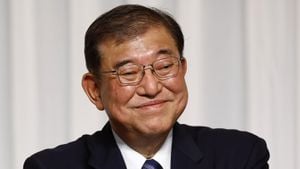President Biden’s trip to Peru and Brazil, which starts Thursday, was supposed to be his final chance to tell fellow world leaders he had been right all along about America’s role on the global stage. The objective was to convince them his predecessor, Donald Trump, was merely a one-time aberration whose America First policies had been swept aside by the electorate. Instead, Biden will find himself grappling with the reality of Trump’s return, beginning his second term as president-elect.
Biden's commitment to revitalizing global institutions and partnerships stands to be eclipsed once again by Trump’s isolationist stance, marked by disdain for allies and an affinity for authoritarian regimes. The upcoming summits—a backdrop for Biden's intended reaffirmations of his foreign policy legacy—are instead shaping up to be eulogies for the era of American diplomacy he had hoped to champion.
“He’s not in a position to assure people about U.S. foreign policy after Jan. 20, so it’s not his to predict or guarantee,” remarked Richard Haass, the former president of the Council on Foreign Relations. Haass pointed out the marks of the trip would symbolize the stark contrasts between two divergent visions for America’s role worldwide.
Former deputy assistant secretary at the State Department, Ricardo Zúñiga, bluntly stated, “A lame duck is a lame duck, and they know it.” Despite facing these challenges, Biden and his aides insist he remains committed to pursuing his agenda until the very end of his administration.
He’ll touch on issues like migration and climate change during his time at the summits. Specifically, Biden will become the first sitting U.S. president to visit the Amazon rainforest, where he intends to highlight U.S. investments aimed at combating climate crises. Jake Sullivan, the president’s national security adviser, reassured observers by stating Biden would affirm the importance of alliances to national security, emphasizing how they amplify America’s capabilities.
One significant meeting during the trip is expected to occur between Biden and Chinese President Xi Jinping. This second encounter within the year seeks to address rising tensions exacerbated by recent cyber intrusions linked to Chinese hackers.
“We have made clear over time we will respond when we see actions taken related to cyberattacks and cyber espionage,” Sullivan asserted, hinting at the administration’s firm stance on such matters.
Among Biden’s aims, he will be urging the need for stable diplomatic channels to remain open as Trump transitions to office with promises of aggressive policies toward China, including potential new tariffs. It’s likely many of Biden’s discussions will keep falling within the shadows of Trump’s upcoming administration, focusing on continuity rather than innovation.
Migration is another key focus for Biden, particularly generated by crises stemming from Central and South American nations. His long-term policy proposals aiming at collaborative efforts throughout the region might be swiftly undone by Trump, who has different ideas about immigration and border control.
While stopping at the Amazon, Biden will want to renew commitments to combat climate change. Yet Trump’s campaign promises to “drill, drill, drill” for oil and gas signify stark contrasts between the two leaders’ environmental policies. Brazil's President Luiz Lopes da Silva emphasized this point, urging Trump to adopt policies mindful of the planet's future.
Biden’s challenges don’t end there; he’s also likely to address Ukraine, continuing to rally for military aid to counter Russian aggression, as Trump’s return might bring skepticism among Republican lawmakers about supporting such funding. The president's ambitions of firm resolutions may clash directly with Trump’s intent to reassess or restrict aid.
The atmosphere at the summits will also reflect changing tides as Biden attempts to reinforce his stance on democracy and alliances. His opponents may gauge how U.S. policies are about to shift and question America’s reliability. All these layers add to the narrative of Biden's trip functioning as something of both farewell and apprehension.
Trump’s impact stretches across numerous pressing global issues, fundamentally reshaping how foreign leaders perceive U.S. reliability. Notably, conversations surrounding Ukraine, climate change, and China—once predominantly driven by U.S. policy under Biden—are now subject to Trump’s personal inclinations.
The underlying message on Biden’s final global summits may very well be colored by the specter of Trump’s presidency looming larger than usual. The awaited exchanges could symbolize transitional uncertainty, echoing anxieties around collective international efforts moving forward.
Overall, Biden’s international efforts throughout these summits stand as poignant reminders of not just personal ambitions but also the fluid dynamics now affecting global politics. He approaches complex realities of shifting allegiances, fluctuated priorities, and what remains of the diplomatic ideals he held dear.
With international leaders already adapting to the consequences of Trump's radical victory, Biden’s upcoming ventures seem to set the stage for grappling with inevitable transformations within the geopolitical framework—foreseeing drastic changes as the U.S. leadership itself hovers precariously on the edge between legacy and imminent realignment under Trump.
It's evident the days of easily categorizing America's diplomatic approach are fading. Political landscapes morphing toward varying degrees of transactionalism lay the groundwork for future interactions on multiple fronts.
Yet even as Biden aims to deliver messages of unity and persistence among allies, the reality persists: the impending shift will inevitably challenge established frameworks as Trump's leadership heralds alternating dispositions, balancing cooperation with autocrats and redefining traditional ties shared with democratic allies. Biden's summits, then, may paradoxically serve as curtain calls not just for his career but also for fundamentally altered international norms.
This global snapshot underlines the urgency with which Biden must now navigate the closing days of his presidency. For world leaders, the true nature of alliances rests uncertainly on the horizon as Trump repositions U.S. interests through his lens of populism and isolationism.
Much hangs on upcoming transitions and dialogues across the Americas, not only to preserve the essence of cooperative outreach established earlier but also to tackle the realities posed by changing leadership at home, redefining the rules of engagement on the global stage.



